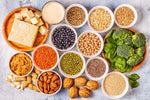
Vegetarian Protein Sources for Muscle Growth and Repair
, by Sandesh Prasannakumar, 10 min reading time
Stay tuned, Your Favourite supplements will be back in stock soon!
Stay tuned, Your Favourite supplements will be back in stock soon!
Stay tuned, Your Favourite supplements will be back in stock soon!
Stay tuned, Your Favourite supplements will be back in stock soon!
Stay tuned, Your Favourite supplements will be back in stock soon!
Stay tuned, Your Favourite supplements will be back in stock soon!
Stay tuned, Your Favourite supplements will be back in stock soon!
Stay tuned, Your Favourite supplements will be back in stock soon!
Stay tuned, Your Favourite supplements will be back in stock soon!
Stay tuned, Your Favourite supplements will be back in stock soon!

, by Sandesh Prasannakumar, 10 min reading time
Strengthening and developing muscles is a crucial component of any training program. Despite the popular opinion that the only way to get enough protein is through the intake of animal products, there are many other sources of vegetarian protein that are just as useful in muscle construction and repair. This blog will review the several types of vegetarian proteins, the advantages of including them in the diet, and how to include them in a muscle-building diet plan.
Protein is a macronutrient that is required for the formation of new muscle tissue and the repair of damaged muscle tissue. It is involved in different metabolic activities such as the production of enzymes, immunity and control of hormones in the body. Protein is particularly important for athletes and other physically active individuals as it helps in the building of new muscle tissue and the repair of damaged tissue after training.
The daily requirement for protein, also known as RDA, is also relative to certain factors such as age, sex and level of activity. Protein intake is crucial, and for people who want to gain muscle, it is recommended that they take 1. 2 to 2. You should take at least 2 grams of protein for every kilogram of your body weight every day. It is then important that vegetarians have to ensure that they are meeting these requirements through proper and balanced meal intake.
Examples: Lentils, chickpeas, black beans, and kidney beans.
Benefits: Legumes are rich in protein, fibre, and essential nutrients like iron and folate. They are versatile and can be used in various dishes such as soups, salads, stews, and dips.
Protein Content: Approximately 15-18 grams of protein per cooked cup.
Benefits: Quinoa is a complete protein, meaning it contains all nine essential amino acids that the body cannot produce on its own. It is also gluten-free and high in fibre, magnesium, and antioxidants.
Protein Content: Around 8 grams of protein per cooked cup.
Benefits: Made from soybeans, tofu and tempeh are excellent sources of high-quality protein. They are also rich in calcium, iron, and magnesium. Tofu is highly versatile and can absorb the flavours of the dishes it's cooked with, while tempeh has a firmer texture and a nutty flavour.
Protein Content: Tofu contains about 10 grams of protein per 100 grams, while tempeh has approximately 19 grams of protein per 100 grams.
Benefits: Edamame are young soybeans that are harvested before they have ripened. They are rich in protein, fibre, and various vitamins and minerals. They make a great snack or addition to salads and stir-fries.
Protein Content: About 17 grams of protein per cooked cup.
Benefits: Greek yoghurt is strained to remove most of its whey, resulting in a thicker product with a higher protein content compared to regular yoghurt. It is also rich in calcium and probiotics, which support gut health.
Protein Content: Approximately 10 grams of protein per 100 grams.
Examples: Almonds, chia seeds, flaxseeds, pumpkin seeds, and hemp seeds.
Benefits: Nuts and seeds are nutrient-dense foods that provide not only protein but also healthy fats, fibre, vitamins, and minerals. They can be eaten as snacks, added to smoothies, or used as toppings for various dishes.
Protein Content: Varies, but generally around 6-10 grams of protein per ounce (28 grams).
Benefits: Seitan, also known as wheat gluten, is a popular meat substitute among vegetarians. It is rich in protein and has a texture similar to meat, making it a versatile ingredient in many dishes.
Protein Content: About 25 grams of protein per 100 grams.
Benefits: Spirulina is a blue-green algae that is incredibly nutrient-dense. It is rich in protein, B vitamins, iron, and antioxidants. It can be added to smoothie juices or taken as a supplement.
Protein Content: Approximately 8 grams of protein per 2 tablespoons.
It also helps to ensure that you take balanced and diversified vegetarian protein sources to meet your protein requirement in building muscles and tissues. Here are some tips on how to incorporate these protein sources into your diet:
Breakfast:
Lunch:
Snack:
Dinner:
Evening Snack:
You don’t need to consume animal products to obtain protein sources that are necessary for muscle building and repair; there are many options for vegetarians. There are many foods that support protein intake and other necessary nutrients, like beans, quinoa, tofu, tempeh, edamame, Greek yoghurt, nuts, seeds, seitan, and spirulina. By incorporating these foods into your diet plan, it will be easier for you to get your daily dose of protein while having a rich and healthy meal. Here are some great protein foods that every vegetarian should include in his or her diet plan for muscle building and overall fitness.
Remember, consistency is key. Consuming these foods at least three times a week will help build and repair muscles through the essential nutrients that are contained within. Therefore, include these healthy and delicious foods in your diet and learn the impacts they have on your health and fitness.